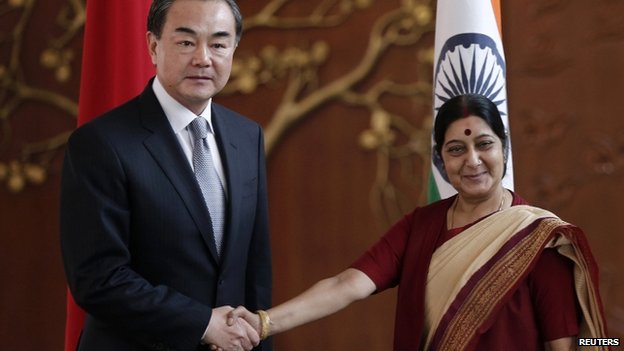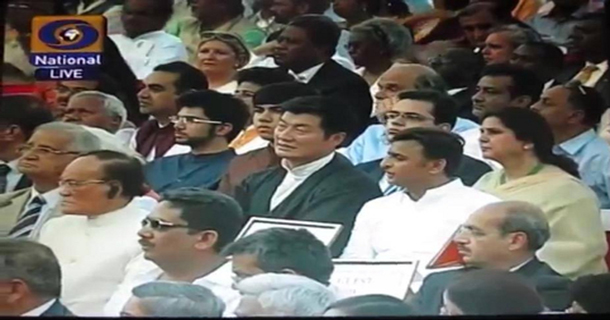All eyes are on Narendra Modi and the Bharatiya Janata Party (BJP). Since their landslide victory in the general election last month, Tibetans and Indians alike have been seeking signs that the Modi administration will be able to keep it’s campaign promises of economic invigoration and a revitalised Indian foreign policy. Early actions by the administration suggest that it recognises the major role that China has to play in achieving these goals, and there is evidence that a fresh China policy, coupling intensive economic cooperation with a newly-assertive foreign policy, is emerging.
Narendra Modi and the BJP swept to victory in May on a platform of economic growth and the dawn of a new Indian prosperity, and it was not the Indian electorate alone that responded warmly to this econo-centric agenda. On June 8, just two weeks following Modi’s inauguration, Chinese Foreign Minister Wang Yi led a special envoy to New Delhi for two days of talks with India’s Minister for External Affairs, Ms Sushma Swaraj. The meetings, which centered around increases in Chinese direct investment and the creation of “special economic zones,” present Prime Minister Modi with the prospect of an economic revival fueled by heavy Chinese investment and trade. The talks present China with the potential to access the vast emerging Indian market, and the chance to strengthen ties with a regional power at a time when the United States has shifted its foreign policy focus to containing global Chinese influence. Indian and Chinese comments on the June meetings suggest that both nations recognise the economic potential in what Foreign Minister Yi described as “the emerging tip of a massive buried treasure.”
Two long-standing issues complicate prospects for a new era of Sino-Indian partnership, however. The first is the series of territorial disputes over portions of Ladakh, Sikkim, and the north eastern state of Arunachal Pradesh that have plagued Sino-Indian relationships for over fifty years, manifesting most recently when the Chinese military made incursions into Ladakh in March. Though the June meetings between Foreign Minister Yi and Minister Swaraj included negotiations over the disputed territories, Prime Minister Modi has already taken a more assertive position on territorial and foreign policy issues. Since his term began, Modi has ordered the construction of military-grade highways and the fortification of 54 border posts in Arunachal Pradesh, and named VK Singh, a former army chief and well-known “hawk” on national security issues, Minister of State for the “North Eastern Region.” The Modi administration has also begun to reach out to the governments of Sri Lanka and the Maldives, which have developed closer ties with China in recent years, presumably in an effort to counter China’s growing influence in South-East Asia. These actions seem to indicate that Modi and the Hindu nationalist BJP intend to defend Indian foreign policy interests against China more vigorously than its predecessors.
A second complication for Sino-Indian relations is the Modi administration’s early treatment of tibetans living in exile. Though Indian police halted a sizeable Tibetan protest against Foreign Minister Yi’s visit to New Delhi before it reach the Chinese embassy, the Prime Minister has taken a number of small but meaningful steps with regard to the Tibet issue. The first was his decision to invite Sikyong of the Central Tibetan Administration (CTA) to his swearing-in ceremony on May 27, and to seat him in a front section – a move that led China to file a formal protest with the Indian government. Second is the Prime Minister’s appointment of Dr. Ajit Kumar Doval, a known supporter of the CTA and the Tibetan exile community, as National Security Advisor. These actions may appear slight, but they reflect the Modi administration’s greater willingness to stand up to China on foreign policy matters, and to assert an early, if temperate, support for the Tibetan exile community.
The exact balance the Modi administration seeks to strike between economic co-operation with China and deterrence against Chinese encroachment on Indian foreign policy interests remains to be seen. For the international Tibetan community, much depends on this calculation. Should Modi pursue intensive economic engagement with China, India’s Tibet policy could be at risk of becoming subject to Chinese economic influence (as many argue has become the case in Nepal, for example). Should the Prime Minister pursue too aggressive a foreign policy agenda, any potential for meaningful bilateral negotiations on Tibet would likely be lost. Until Modi strikes his balance, the precise nature of Sino-Indian relations and the future Tibetan cause will remain uncertain.






 Print
Print Email
Email